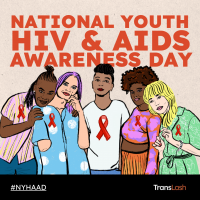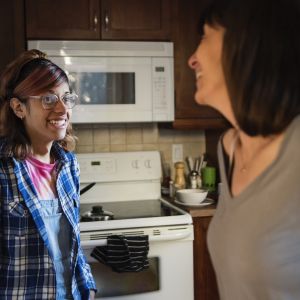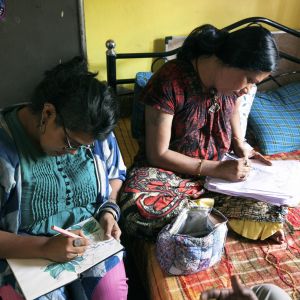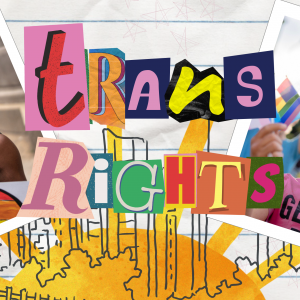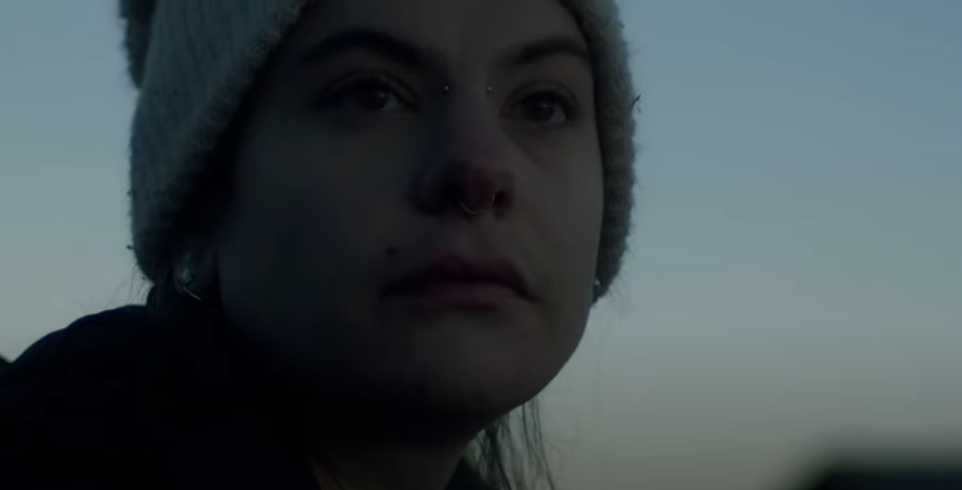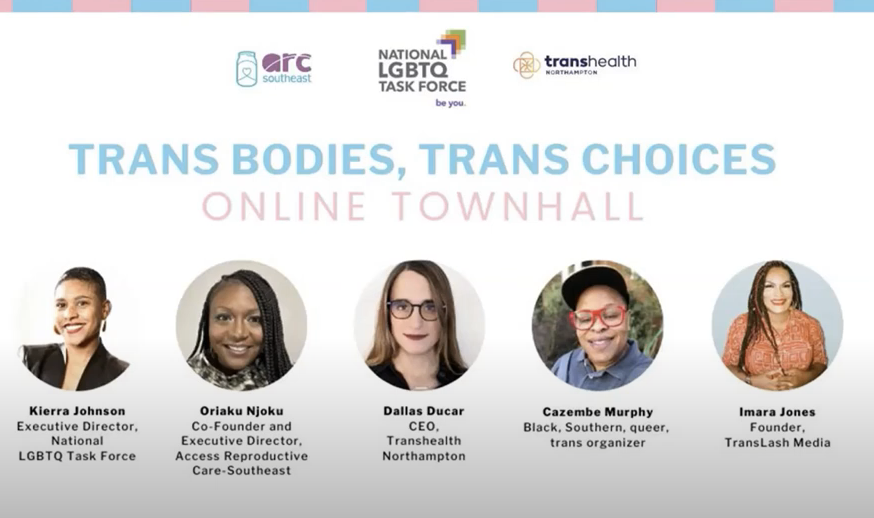By Sara Youngblood Gregory
States across the country are introducing waves of legislation that target LGBTQ+ people, but especially trans people. The ACLU is currently tracking a staggering 491 anti-LGBTQ bills in the 2023 legislative session. Conservative states like Texas, Florida, Iowa, and South Carolina are homes for particularly aggressive bills.
The Florida Senate has already passed an extreme ban on gender-affirming care for minors, criminalized bathroom use for trans people, and restricted drag performances. Trans people in Florida are already feeling the effects, are planning to leave, or have already left the state — especially families with trans minors.
The decision to move away isn’t available to everyone, as some trans folks who would like to leave the state are unable to due to familial, financial, or legal reasons. For those who do flee, coping with this decision is much more than just logistical. It’s also deeply emotional, with many feeling a mix of grief, guilt, regret, and relief.
TransLash spoke to six trans Floridians, some who have already left, and some who are preparing to leave, about the emotional impact of escaping a place that is dangerous — but is also your home.
Oliver
Oliver (he/him) is a 22-year-old transmasc Miami resident who left Florida for New York City. In Florida, he worked as a teacher and made the decision to leave because he “could not build a life down there [in Florida] as a transgender educator.”
For Oliver, the decision to leave made sense from a logistical standpoint: “As a transgender individual, Florida is scary enough (and that was before I left), but being a transgender worker in the very field in which my community is being attacked is terrifying. It was also, logistically speaking, not the right decision for me to start building a pension and saving for retirement in a career that I could potentially be fired from in the coming years due to my identity. From a financial standpoint — passion and love aside — one of the only things that makes teaching worth it is the stability of the career. Florida’s teacher salary is among the lowest in the country, and without job stability due to me being trans, it wasn’t a viable option for me. I moved a few months ago. Had I stayed in Florida, my access to healthcare would probably have been compromised as well.”
Emotionally, Oliver says it’s heartbreaking that for some people, their home always gets to feel safe. “But for me, it’s different. I always say that I don’t hate Florida, Florida hates me,” he says. “I wasn’t forced out in the sense that I was forced to move to another state or I would be killed, but I was forced out in the sense that I would lose my humanity and dreams for every day I stayed there.”
As a teacher, Oliver says he feels guilty leaving his queer students behind, in a state where “their right to a safe learning space is being challenged every day. I feel like a hypocrite for telling them that everything will be okay if they just keep fighting, but I couldn’t even do it myself. My heart breaks every time another law passes that could endanger a trans kid’s life, or threaten the wellbeing of a queer child. I also worry about my queer friends who can’t afford to just up and leave the entire state they grew up in. I just have to keep reminding myself that I don’t owe anyone a fight. I’m tired of fighting. I just want to be happy.”
Though he was initially worried about moving away from family and friends, Oliver says his mental health is so much better in New York: “Now that I’m here permanently, I can breathe easier. I can go out and see people like me thriving. I feel freer in every sense — freer to advocate for myself and my community, to meet people, to explore, to be open about who I am and what I believe in, to teach effectively and passionately, to love and be loved publicly.”
Oliver said he never thought he, a child of immigrants who came to the US for freedom, would have to move to ensure that freedom. “As hard as it was, the move made my relationship with my family so much stronger. Moving out of Florida was the best decision I’ve ever made. Even though it felt literally impossible, I did it, and it was so worth it,” says Oliver.
Hollen
Hollen (they/he) has lived in Florida for nearly 20 years, and spent the last decade in Jacksonville. Now, the 29-year-old trans-Floridian is leaving along with their family: their fiance and co-parent, both of whom are transfemme, their co-parent’s partner, who is two-spirit, and Hollen’s child. Together, they are planning to go to Portland, Oregon.
“We all have different factors to consider for our lives but Oregon seems to cover all of our needs with its protections in place for trans people and its healthcare, plus we have some friends out there who left Jacksonville about a year ago, so I know it’s possible and it wouldn’t feel like starting over completely,” says Hollen.
There are a few factors that determined Hollen’s need to leave: access to gender-affirming care, co-parenting a child as two trans adults, and bathroom bans. Most pressing, is the care of Hollen’s child:
“My co-parent and I have been dealing with the legal system while trying to get divorced. We’ve been separated for a long time, but it’s not a pleasant experience, in general, to get a divorce and go in front of a judge and all. With the current legislation in place ‘protecting’ children from becoming transgender, we have been afraid of anything backfiring for us and feel we are at risk of having our identities play into how ‘safe’ a child is in our care because we are trans. We’ve used a few different sets of pronouns for our child through the years at their request. They came out as non-binary at age three and we don’t want to live somewhere where that is cause for concern. We are terrified of losing our child. While it probably won’t happen, it legally could.”
Already, Hollen has made changes to protect their child such as homeschooling them to avoid exposure to “the ridiculous educational standards that DeSantis is enacting, particularly with the new legislation in place that directly affects trans youth in schools by not validating their names and pronouns, [or] bathroom bans,” says Hollen. “We want our child to be comfortable in their identity, to know about things like diversity, and the evils this country has put people through instead of ignoring anything that doesn’t correspond with a very narrow set of beliefs supporting white nationalism.”
Hollen grew up in Florida, and he says leaving here comes with so much sadness, however necessary the move is:
“My independence and life habits were formed here. I learned to drive here, to maintain a house here, to meet people and make friends in this culture. It is sad to me, the idea of leaving. Every time I walk out my door and see swarms of lizards scatter in every direction with my footsteps, I get choked up. When I see white herons flying overhead, or think about the crystal clear springs I grew up around, or go to the beach for a day with my friends and family, I feel all hollowed out and echo-ey inside. Florida is beautiful, and much of my life has been here, and the idea of moving to somewhere I have so little experience with is terrifying. I talk a lot with friends about how awful Florida is, but the reality is that it’s familiar, and it is my home, and I am sad that I’m leaving due to factors beyond my control.”
The hardest part, though, is leaving family.
“My family is here,” says Hollen. “My niece and my child are the same age and are great friends. To leave my niece behind when she can’t fully grasp what’s happening or why this is happening is so heart-wrenching. She idolizes me, and I want someone in her life to be representative that you can be who you want to be, no matter what that looks like. I don’t want to take away that aspect of her experience. I don’t want her to feel like she’s being abandoned. I just recently opened up to my mom about leaving so soon and she’s grief-stricken at the idea of never being able to see my child again, not being able to be present in our lives, and not knowing what life holds for me so far away.”
Hollen has a strong community here of transmasc friends, coworkers, and family. The reality of leaving these pillars brings Hollen “anguish beyond words — turmoil.”
But at the same time, there are happier aspects of the move.
“I do feel relief! I feel joy. I feel excited,” he says. “I’m excited to live with my girlfriend and build a new life and routine and home, to rely on each other in new ways and to get to have more depth in our relationship. I’m excited for my child to be able to have more opportunities for friendship and be around more people who are going to understand them, to have more educational opportunities and a welcoming environment. I’m a little jealous that they’re being set up to be the coolest person ever, and glad that we can give them that, in addition to giving them safety and security.”
Cyrus and Grayson
Cyrus (he/they) and Grayson (he/they) are both trans men living together in Orlando. The couple met in cosmetology school in the area — Cyrus, 19, was studying to be a hairdresser and Grayson, 21, a nail technician — and the two moved in together. As soon as Cyrus graduates this Fall, they plan to move together to Philadelphia, to live with Grayson’s sister.
Both feel they have to leave Florida, as Grayson’s hormone provider is no longer offering testosterone prescriptions.
“My biggest concern right now is having access to our hormones because, obviously, that is important. But also I have PCOS [polycystic ovary syndrome], which is a hormone imbalance. So my testosterone really helps to level out my stuff [and get me] where I need to be,” says Grayson. “We’re sharing our hormones right now, which is not legal or good. I have a few friends who are giving us their spare hormones. That is literally like the only thing that will help us get through the year. The kind of running joke right now is that the community is really just passing around the same $10. [But] what we really need right now is support from everyone.”
“I’ve been fighting with my insurance to have my top surgery covered for probably two years now. I’ve had a lot of consultations, probably five, and all of them have been individually traumatic,” says Cyrus.
Safe access to hormones and gender affirming care is a main motivator to both Cyrus and Grayson. But leaving also comes with risks: Cyrus, 19, received housing support through Florida’s foster care system and stands to lose his benefits when they move.
During their time in Orlando, the couple has found joy living in “one of the gayest parts of Florida” as Cyrus puts it, building up not only a community, but also financial footholds. When we spoke, Grayson had just started his first day of work as a nail technician. He worries about starting over again and finding a new client base when they leave town.
“I think it’s important for anybody to leave their hometown, but it’s terrible that I’m being forced into this,” says Grayson. “It’s incredibly sad. Talking to my other trans friends, I feel like it’s just a community-wide sigh, this feeling of like, ‘fuck, this is what is happening right now. This is the place we’re at.’”
For Cyrus, who dealt with housing instability before moving to Orlando, he worries that moving will also impact his education. “I’ve created myself a home and I cannot believe I’m leaving so soon. I had so many more plans and it’s so unfortunate I’m losing my benefits. I planned to stay in school as long as I can afford it. I wanted my bachelor’s in business. And now I really don’t know when I’ll be able to go back to school. If I go back to school [at all],” they say.
Along with feeling through their major losses, both are excited for a life in Philly, and with family. They plan for a two-bedroom, where Grayson says, “Our friends can come and stay, and they can figure out their shit. If they wanna go to Colorado or they wanna go to New York we can be a safe space. And it’s something that we both severely value.”
Haris and B
B (they/she) and their spouse Haris (he/him) have both spent much of their lives in Central Florida. After meeting in Lakeland, Florida in 2014, B and Haris got married in 2017. They moved to Maryland but eventually came back down to Florida to reconnect with their community.
B and Haris made the decision to return to Maryland, with Haris going up first and B joining a few months later.
Haris, a 30-year-old trans man, says “The decision to leave Florida was simple to me. I feel forced out in more ways than just anti-queer legislation. I felt forced out by rent skyrocketing. I felt forced out by jobs that told me I was family, but disposed of me when I was in need. I felt forced out by so much fake allyship who would rather give you crumbs than take two damn minutes to make a PB&J when you’re in need.”
Haris began his transition in Maryland, but says he had a much harder time accessing care in Florida.
“I never had any issues with [in Maryland] with insurance covering testosterone, and top surgery would’ve been covered but I moved too soon. There was a program that helped me change my name and gave me all the tools to change my gender marker with ease, and it was all free and covered either by government assistance or insurance,” says Haris. “When I got back to Florida, I immediately experienced difficulty in finding a healthcare provider who could both prescribe testosterone and be my primary care doctor. I ended up without a primary care doctor because my insurance got worse and visits became more expensive even though I was making less money. The most recent situation encountered was that I had a hysterectomy consultation scheduled that got canceled immediately after Desantis signed another bullshit law.”
For B, a 29-year-old queer and nonbinary person, watching their sense of safety and community be jeopardized by the government “feels utterly gut-wrenching.” They’d been struggling to reestablish themselves in Florida during the pandemic, but it was getting more and more difficult every year.
“Haris isn’t my only trans partner. The fear and reality of him and them not only losing access to his medication — but all of us getting targeted for our genderqueerness — has made the idea of establishing roots here feel utterly impossible,” says B.
Haris says it’s been a huge relief to leave Florida, and he already has access to a primary care doctor and prescribed testosterone. “I feel calm and at rest with myself,” he says. “I’ve been able to start the conversation about getting grant funding for affordable housing for queer Florida refugees. I feel like I have some purpose here and that I can make a difference.”
For B, it’s a bit more complicated. There is some shame, she says, for leaving and a lot of grief:
“[There is a] weight of leaving. Of feeling like most of the choice got taken from us. Feeling like staying meant putting our lives and families’ life at continuous risk. Feeling like leaving is a disservice to the community we want to help fight for and protect. Feeling guilt that protecting our safety felt more important. It all holds a lot of weight. I would love to be able to stay and feel like I can fight and help turn back what has been created. I also want to live. I also want to feel safe. It could be selfish, or it could be dramatic, but I spent a lot of my life not thinking my existence was important and I care about shifting that now. I am grieving the life we could have had here, the roots we could have planted deeper, and how they could have potentially flourished.”
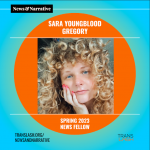
Sara Youngblood Gregory (she/they) is a non-binary lesbian journalist and writer. She is the author of THE POLYAMORY WORKBOOK and a former staff writer for POPSUGAR. She covers sex, queerness, disability, culture, and wellness. Her work has been featured in Vice, Teen Vogue, HuffPost, Bustle, DAME, Cosmo, Jezebel, and many others.
Sara serves on the board of the lesbian literary and arts journal Sinister Wisdom. As a poet, Sara has been nominated for a Pushcart Prize, Best of the Net, and Best New Voices. She’s also attended the Kenyon Review Workshop in 2019 and 2022, as well as a Winter Tangerine poetry workshop. Her chapbook RUN. is out now.






